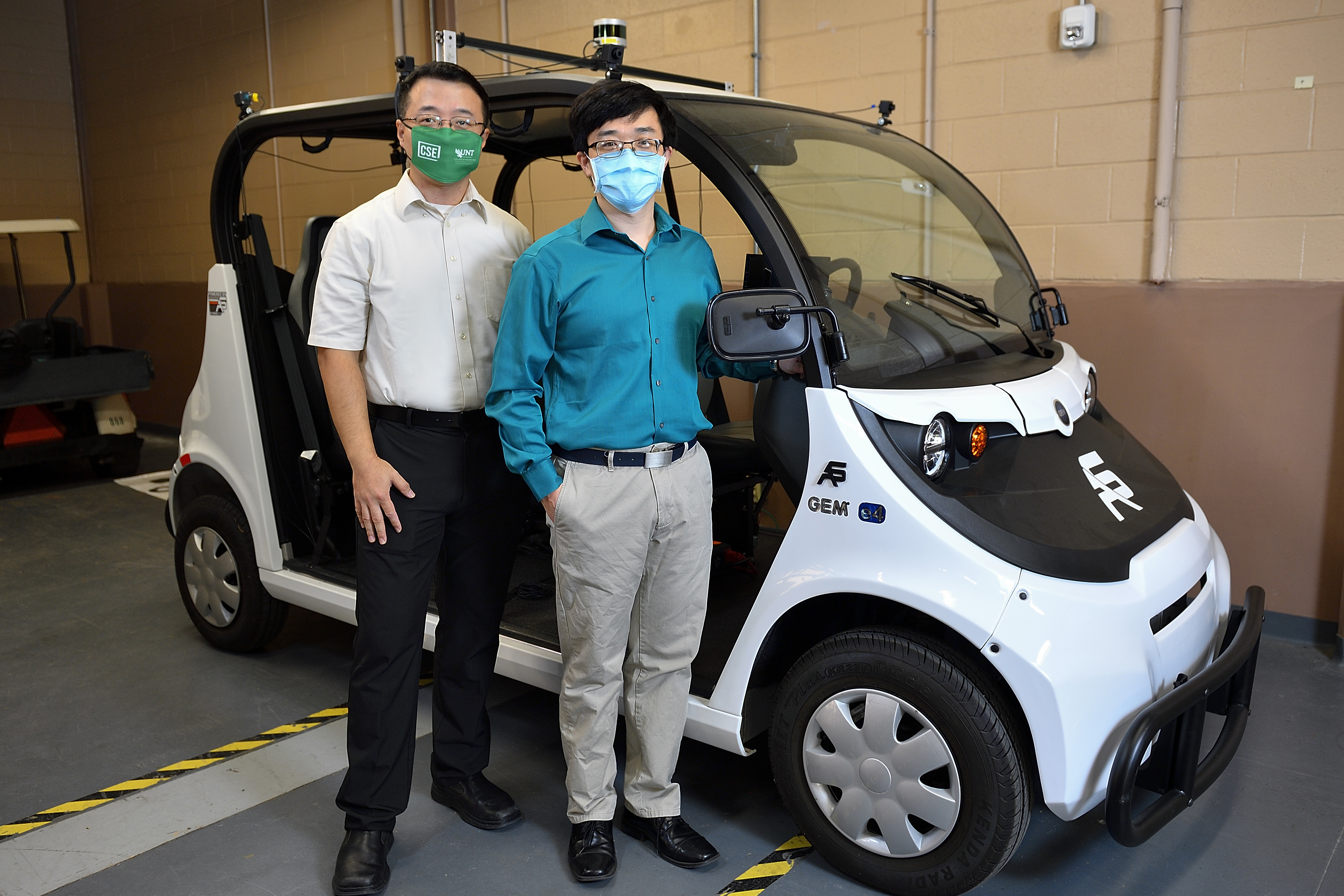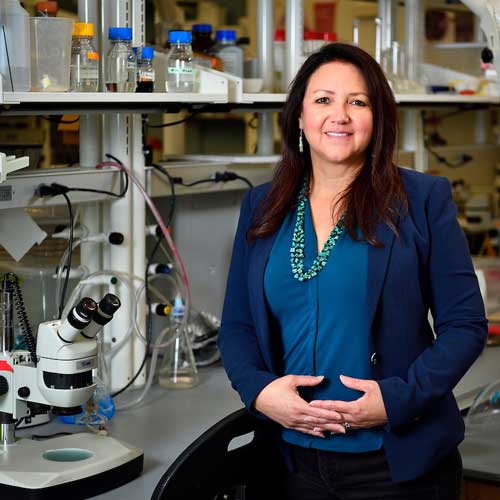|
|
|
|
|
|
 |
|
Connecting autonomous vehicles
Qing Yang and Song Fu, UNT faculty researchers in the Department of Computer Science and Engineering, have earned $1 million in grant funding from the National Science Foundation this year for their connected and autonomous vehicles (CAV) projects. Grants include a workforce development grant for researchers in CAV and an NSF EAGER award that will fund research into security and privacy solutions for cooperative perception among autonomous vehicles. Earlier this year, Yang and Fu were awarded $400,000 from the NSF to help make data collection and processing by autonomous vehicles more efficient.
|
|
|
|
|
|
|
|
 Reducing disparities in special education Reducing disparities in special education
Brenda Barrio, associate professor of special education and lead faculty for the Innovative Educational Equity and Career Pathways branch of UNT's new Center for Racial and Ethnic Equity in Health and Society (CREEHS), is researching the disparities in diagnoses and treatment of young children with Autism Spectrum Disorder (ASD) from culturally and linguistically diverse backgrounds, who are far less likely than their peers to be diagnosed early. In collaboration with Susan Nichols, interim executive director of UNT's Kristin Farmer Autism Center, Barrio and a team of student researchers will survey caregivers and parents of young children with ASD from diverse backgrounds, including the Hispanic and Latinx community, where there has been very little research. Barrio says the community-based research will not only help children with ASD and their families across Texas, but it will help prepare students in teacher education programs as well. Read more about Barrio's research, and watch a video to learn more about CREEHS.
|
|
|
|
|
 |
|
| One of 100 most inspiring Hispanic/Latinx scientists |
|
Pamela Padilla, associate vice president for research and innovation, has been inspiring fellow researchers and students at UNT for years, so it comes as no surprise that she was recently named as one of 100 Inspiring Hispanic/Latinx Scientists in America by prestigious journal publisher Cell Press. Honorees were selected based on scholarly achievements, mentoring excellence and commitment to diversity, equity and inclusion. “As one of just 16 Carnegie-ranked Tier One research universities designated a Hispanic-Serving Institution, UNT is committed to cultivating a research university that reflects our values,” says Mark McLellan, UNT's vice president for research and innovation. “Dr. Padilla represents the best of our researchers and is truly an inspiration to many.” Padilla's long list of recognitions for her leadership and research includes her election in January as president of the Society for Advancing Chicanos/Hispanics and Native Americans in Science. Learn more about Padilla's research and watch a video about her mentorship at UNT.
|
|
|
|
|
|
|
| Helping minority-owned restaurant owners |
|
College of Merchandising, Hospitality and Tourism researchers, Xi Yu Leung and Jiyoung Kim, are working to help minority-owned small restaurant owners make more informed decisions when it comes to social media advertising. Backed by a Facebook Research grant, the year-long study will compare the cost effectiveness of data-driven ads on Facebook and contextual ads on YouTube for small, minority-owned restaurants. The interdisciplinary project was one of five chosen by Facebook from nearly 200 proposals around the world in its Economic Impact of Digital Technologies research awards.
|
|
|
|
|
|
|
| Studying widening gender gap |
|
A study co-authored by Buddy Scarborough, assistant professor of sociology, found that the pandemic has affected the work life of mothers significantly more than fathers. In analyzing data from the U.S. Current Population Survey from February to April, Scarborough and co-authors found that mothers reduced their work hours four to five times more than fathers, which widened the gender gap in work hours by 20-50%. Scarborough and his research partners plan to continue studying the pandemic's impact on the labor force, but hope their current study can shed light on the gender inequalities this health crisis is deepening.
|
|
|
|
|
|
|
| Bringing world-class research to UNT Chemistry |
|
The new Welch Chair of UNT Chemistry, Shengqian Ma, will be leading an internationally recognized chemistry research program focusing on functional nanoporous materials. He will play an important leadership role during a planned growth phase in the UNT Department of Chemistry. The UNT Welch Chair in Chemistry was founded nearly twenty years ago with a $2M endowment built on gifts from the Welch Foundation and private donors. Ma comes to UNT from the University of South Florida, where he established himself as a world-renowned expert in the chemistry of porous materials. Potential applications of his discoveries include environmental remediation, energy production and storage, and drug delivery.
|
|
|
|
|
|
|
| Analyzing large multilayer networks |
|
Sanjukta Bhowmick, associate professor of computer science and engineering, has received a new grant from the National Science Foundation to develop theoretical foundations and software to more effectively analyze large multilayer networks, like those used by organizations such as Netflix, Amazon or Facebook to determine user recommendations. Bhowmick's research focuses on graph theory, using a technique known as network decoupling, which she says could have applications from social media and other technology to biology or epidemiology, like determining COVID-19's spread, among other areas.
|
|
|
|
|
|
|
| Honoring research accomplishments |
|
Francis D'Souza, University Distinguished Research Professor of Chemistry, has received the Chemical Research Society of India Medal. The society recognizes, promotes and fosters talent in chemistry and chemical sciences and to improve education at all levels. The medal is the highest honor bestowed by the Chemical Research Society of India to scientists of Indian origin working elsewhere. He is an internationally recognized leader in the study of fast electron transfer processes that are the key to solar energy harvesting, sensors and other important technologies.
|
|
|
|
|
|